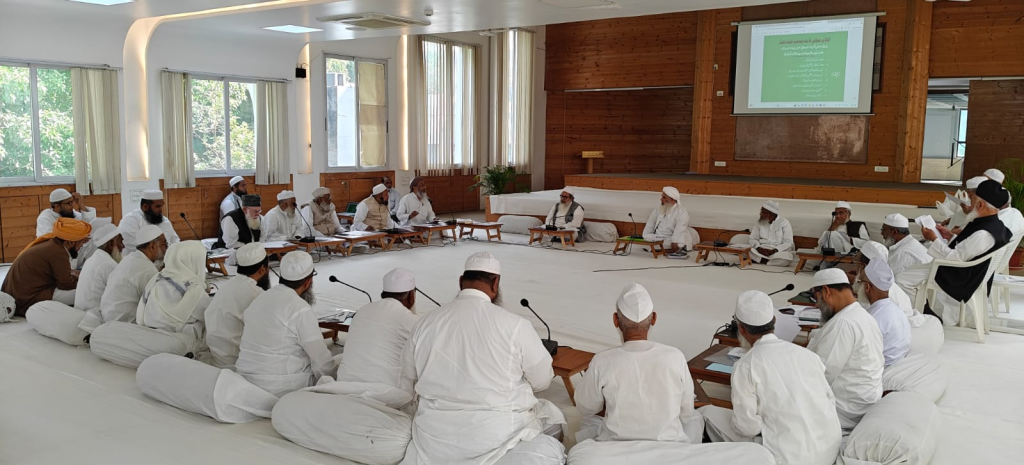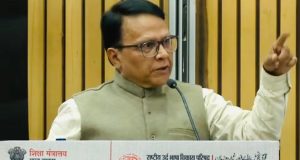Waqf Amendment Act 2025 Unconstitutional and a Symbol of Majoritarian Dominance Jamiat WC urges Government to withdraw the Act and stop suppressing peaceful protests
New Delhi, 13 April 2025: The Working Committee of Jamiat Ulama-i-Hind held a significant meeting today at Madani Hall, ITO, New Delhi under the leadership of its President, Maulana Mahmood Madani.
The meeting focused on several pressing issues including the Waqf Amendment Bill 2025, government action against madrasas in Uttarakhand, the implementation of the Uniform Civil Code (UCC), and the situation in Gaza. The committee adopted important resolutions and also extended the current membership drive.
Representatives and special invitees from across the country participated in the session. A detailed report was first presented outlining Jamiat’s continuous efforts to protect Waqf properties.
The Working Committee passed a resolution categorically rejecting the Waqf Amendment Act 2025, stating it violates several provisions of the Indian Constitution, including Articles 14, 15, 21, 25, 26, 29, and 300-A. The most dangerous aspect of the bill is the abolition of “Waqf by User,” which endangers thousands of historic religious sites—more than 400,000, according to official reports.
The Act’s provision to include non-Muslims in Central and State Waqf Boards is a blatant interference in religious affairs and a clear violation of Article 26. It is a manifestation of majoritarian dominance and is strongly condemned.
The Committee emphasized that Waqf is an essential part of Islamic jurisprudence and a form of religious worship. Any amendment that undermines its religious and legal essence is unacceptable. Amendments, if any, should only be administrative in nature.
The Working Committee also condemned misleading statements by both ruling and communal elements and media propaganda. It affirmed its commitment to presenting the truth to the public.
It reiterated that peaceful protest is a constitutional right and that using force to prevent it is condemnable. However, the Committee also regretted any violent acts during protests, stating that such elements only weaken the Waqf protection movement.
The Committee strongly denounced the Uttarakhand government’s move to seal Islamic madrasas, calling it a direct violation of Article 30 of the Constitution, which guarantees minorities the right to establish and administer educational institutions.
The Supreme Court has also upheld this constitutional provision. Jamiat demanded the immediate reopening of sealed madrasas and warned that it would resort to legal action if the government fails to comply.
The Committee also expressed serious concern over the implementation of the Uniform Civil Code in Uttarakhand and efforts to undermine Muslim Personal Law. These attempts are an assault on religious freedom and diversity.
The issue of UCC is not just about Muslims—it affects all cultural and religious groups in India. Ignoring India’s pluralism will endanger the country’s unity and integrity. Muslim Personal Law is rooted in divine commandments and cannot be altered.
The Committee raised deep concern over the rising trend of bulldozer demolitions by state governments in violation of Supreme Court guidelines. The Court has clearly mandated that due process, including proper notice and a hearing, must precede any demolition.
The recent actions have ignored these safeguards, particularly targeting marginalized communities. The Committee demanded strict accountability from authorities involved in such violations.
On the international front, the Committee expressed grave concern over Israeli atrocities in Gaza, labeling them as war crimes and crimes against humanity. It urged the Government of India to intervene on humanitarian grounds to ensure an immediate ceasefire, facilitate medical aid for the injured, and ensure the delivery of essential supplies to the besieged population of Gaza.
The Jamiat’s ongoing membership drive, which was earlier scheduled to end on 1 April 2025, has now been extended to 31 July 2025. Local and district-level elections will be held between 1–31 August, followed by state elections from 1–30 September.
Apart from Maulana Mahmood Madani (President), Maulana Hakeemuddin Qasmi (General Secretary), the meeting included Maulana Mohammad Salman Bajhnori (Vice President), Mufti Ahmad Devla (vice president) Mufti Syed Mohammad Salman Mansoorpuri (Naib Amir-e-Hind), Maulana Rahmatullah Kashmiri, Maulana Niaz Ahmad Farooqi, Haji Mohammad Haroon Bhopal, Maulana Mohammad Abid Qasmi (Delhi), Haji Mohammad Hasan (Tamil Nadu), Maulana Mohammad Ibrahim (Kerala), Mufti Mohammad Javed Iqbal (Kishanganj), Maulana Mohammad Nazim (Patna), Mufti Habibur Rahman (Allahabad), Maulana Yahya Karimi (Mewat), Maulana Rafiq Ahmad (Baroda), Prof. Nisar Ansari (Ahmedabad), Maulana Siddiqullah Chowdhury (West Bengal), Mufti Yahya (Assam), Mufti Abdul Salam (West Bengal), Maulana Abdul Qadir (Assam), Maulana Ghulam Qadir (Poonch), Maulana Mohammad Aqil (Shamli), Mufti Mohammad Rashid Azmi, Mufti Abdul Rahman (Amroha), Maulana Kaleemullah (Ambedkar Nagar), Maulana Mohammad Salman Bajhnori, Qari Mohammad Shaukat (Wait), Maulana Abdul Hai Muftahi (Mau), Hafiz Obaidullah (Varanasi), Hafiz Nadeem Siddiqui (Maharashtra), Maulana Sirajuddin Chishti (Ajmer), Mufti Iftikhar Ahmad Qasmi (Karnataka), and Maulana Syed Mohammad Madani (Deoband).
 Times Of Pedia Times of Pedia TOP News | Breaking news | Hot News | | Latest News | Current Affairs
Times Of Pedia Times of Pedia TOP News | Breaking news | Hot News | | Latest News | Current Affairs





